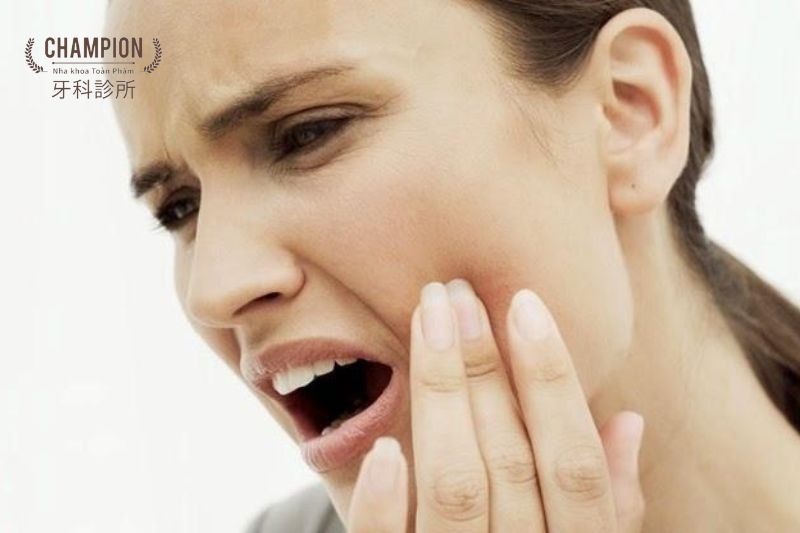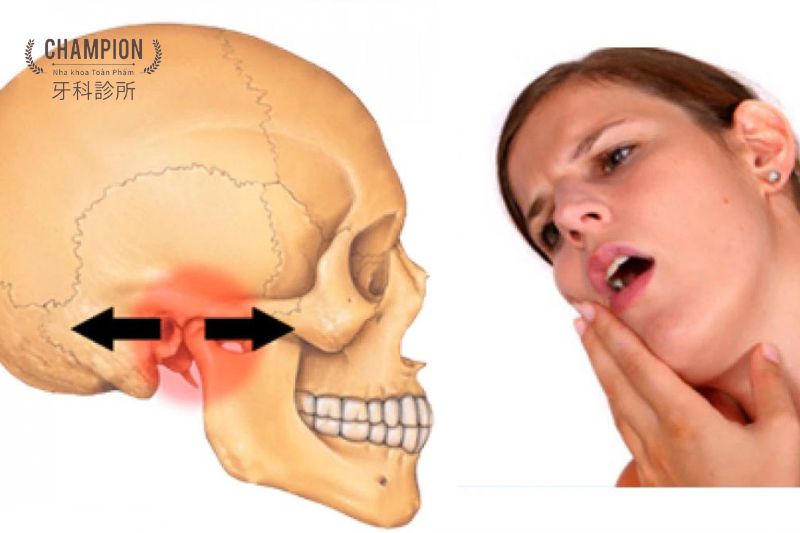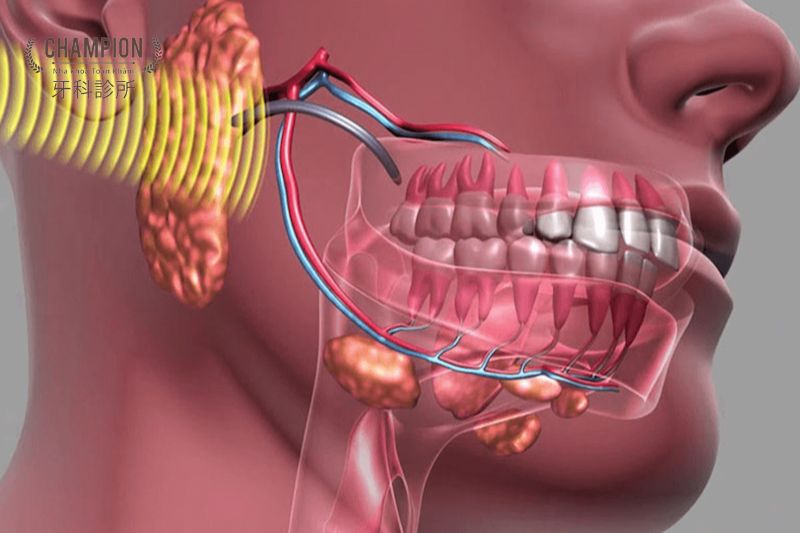Jaw pain is a common condition that can affect individuals of all ages. The discomfort can occur on one or both sides of the jaw, causing inconvenience and impacting daily activities. If you are currently experiencing this condition, refer to the article below from Championd Dental Clinic for more detailed information on the causes, symptoms, and preventive measures associated with jaw pain!
Common Signs of Jaw Pain
Here are some specific signs when you experience jaw pain:
- Aching Pain: This is the most common symptom of jaw pain. The pain can occur on one or both sides of the jaw, presenting as a dull, throbbing ache or intense sharp pain.
- Jaw Stiffness: Jaw stiffness refers to difficulty opening or moving the jaw. It can make activities like eating, talking, or yawning challenging.
- Clicking Sounds: When moving the jaw, you may hear clicking or popping sounds.
- Difficulty Chewing: Pain and jaw stiffness can make it difficult to chew food effectively.
- Swelling: The jaw area may become swollen, red, and warm. Swelling can be caused by various factors, including infection, inflammation, or injury.

Health Risks Associated with Jaw Pain
Some conditions related to the jawbone include:
- Temporomandibular Joint (TMJ) Inflammation: TMJ inflammation is a disorder related to the complex joint between the temporal bone and the jaw. Symptoms often include jaw pain, impaired jaw movement, and clicking sounds during jaw movements. It is more common in adolescent females and during menopause.
- Temporomandibular Joint Dysfunction (TMD): TMD is an abnormal condition affecting the jaw joint and associated muscles, leading to difficulties in jaw movement and mouth opening. Symptoms include inefficient chewing, difficulty opening the mouth, dizziness, ringing in the ears, and radiating jaw pain.
- Lockjaw: Lockjaw typically occurs when individuals grind their teeth during sleep or suddenly open their mouth too wide. Although not a disease, if not addressed early, it can lead to jaw pain, neck pain, facial pain, and earaches. Symptoms include pain during jaw movement, clicking sounds, and difficulty moving the neck.
- Other Jawbone Disorders: Additionally, conditions such as jawbone marrow inflammation, joint degeneration, and synovial fluid inflammation can cause jaw pain and affect jaw movement.
Oral Health Diseases
Dental issues can also be a cause of jaw pain. Swollen gums, tooth root inflammation, cavities, and misaligned teeth can lead to pain and impact the chewing process.
Sinusitis and Nasal Cavity Diseases
Problems in the nasal cavity, such as sinusitis, can affect the jaw. If patients experience nerve pain in the jaw, headaches, or tension, it may be due to these issues.

>> See more: Risks and treatment solutions when wisdom teeth grow out of the cheek
Effective Remedies for Jaw Pain
In cases of mild jaw pain or short-term discomfort, applying home remedies can help alleviate pain and promote quick recovery. Here are some effective methods:
Warm Compress
An effective tip for reducing jaw pain is to use a warm compress. The heat from a warm compress helps relax muscles, reduce pain, and alleviate stiffness. Especially if there is swelling and inflammation, using a warm compress is preferable to cold.
Pain Relievers
For mild to moderate pain, over-the-counter pain relievers like paracetamol or ibuprofen can be used. However, it's essential to follow the recommended dosage. In cases of prolonged pain or the need for long-term medication, consulting a joint specialist or doctor is advisable.
Gentle Massage
Another at-home remedy for jaw pain is gentle massage in the affected area. Use your index and middle fingers to press and massage in circular motions for about 5-10 cycles. Follow this by moving your jaw to help relax the muscles. Repeat the process until the pain subsides.
Dietary Considerations
Diet plays a crucial role in treating jaw pain. Avoid sticky and tough foods, as well as limit chewing gum. Instead, opt for soft foods and cut them into smaller pieces to reduce pressure during chewing.
Change Sleeping Habits
If you often sleep on one side or place your hand under your jaw while sleeping, consider changing this habit. Incorrect sleeping positions can exert pressure on the jaw muscles, leading to discomfort. Lie on the non-painful side to alleviate pressure.

When to Seek Medical Attention for Jaw Pain
Although jaw pain can occur on either side, it is not always a sign of a serious issue. However, if you experience jaw pain accompanied by severe symptoms, especially if the pain persists or recurs, seeking medical help is essential.
Here are signs that indicate the need to see a doctor or dentist:
- Difficulty Eating, Drinking, Swallowing, or Breathing: If jaw pain makes it challenging to perform basic activities like eating, drinking, swallowing, or even breathing, immediate medical intervention is necessary.
- Pain Hindering Mouth Movement: If jaw pain makes it difficult to open or close your mouth, causing discomfort in the right or left jaw, this may indicate an issue that requires examination and treatment.
- Inflamed, Swollen Area, or Fever: If the jaw area is inflamed, swollen, or if you experience a fever, it may be a sign of infection or inflammation. Visiting a doctor is crucial for an accurate diagnosis and treatment plan.
Preventing Jaw Pain: : Tips for Maintaining Jaw Health
To prevent jaw pain, it's important to adopt preventive measures. Here are some practices you can implement to keep your jaw healthy:
- Avoid Chewing Gum and Hard Objects: Limit the use of chewing gum and refrain from biting on hard objects like pens or nails, as these habits can exert pressure on the jaw muscles and lead to pain.
- Use Hand Support for Jaw During Yawning: When yawning, use your hand to support the jaw from below. This helps reduce pressure on the jaw joint and may prevent pain and tension.
- Address Teeth Grinding: If you notice a habit of teeth grinding during sleep, consult a dentist promptly. Teeth grinding can cause significant harm to both dental structures and the jaw, and early intervention can prevent more severe issues.
- Develop a Habit of Chewing on Both Sides: Instead of chewing on one side of the jaw, make a habit of chewing on both sides. This helps distribute pressure evenly on both sides, reducing the risk of one side being affected.
Conclusion
If you have any concerns or issues related to jaw pain, consult with a doctor or healthcare professional. The experts at Championd Dental Clinic, with their specialized knowledge, can provide answers and offer the best preventive methods for your condition. Contact us for advice and to schedule an appointment as soon as possible!
Vietnamese & English: (028) 5411-2295
中文: (028) 5411-2297 172 Nguyen Luong Bang, Tan Phu Ward, District 7, Ho Chi Minh City.
Fanpage: Champion Dental Clinic 牙科診所
Zalo: Champion Dental Clinic
Youtube: Champion Dental Clinic 牙科診所
 Champion Dental Clinic
Champion Dental Clinic



